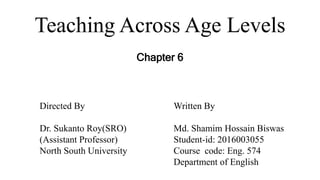
Md. shamim hossain biswas
- 1. Teaching Across Age Levels Chapter 6 Directed By Dr. Sukanto Roy(SRO) (Assistant Professor) North South University Written By Md. Shamim Hossain Biswas Student-id: 2016003055 Course code: Eng. 574 Department of English
- 2. What do you mean by teaching across age levels? Teaching language by addressing the learner variable of age. 1. Teaching Children ≤11, Primary school-aged students 2. Teaching Teens >11 && <18, High school-aged students 3. Teaching Adults ≥ 18, College || University students
- 3. Teaching Children The following approaches may be considered to teach children: 1. Intellectual development 2. Attention Span 3. Sensory input 4. Affective factors 5. Authentic and meaningful language
- 4. The children up to the age 11 are considered as intellectual development stage. This means the growth of a child’s ability to think, find out reason and solve problem. This is the time to organize their minds, ideas and thoughts to make a sense of the living world. They sometimes face difficulty to deductive reasoning. The following statements can be considered to teach under this stage: 1. Do not explain grammar using difficult terms like “Present Progressive” or “Relative Clause”. 2. Avoid abstract term. 1. Intellectual development || Cognitive || Imaginative
- 5. 2. Attention Span Children have short attention span for understanding boring, useless and difficult text. Children feel interest to learn a language when they can use it here and there. To make classes interesting and enjoyable, What teachers need to do? • Design activities that capture the student's immediate attention • Provide variety activities • Teachers need make animated, lively and enthusiastic lessons • To keep children laughing and learning in order to remove sense of humor. • Tap into the students’ sense of curiosity to maintain attention and focus.
- 6. 3. Sensory input Children have five sensory inputs to acquire language : Hearing , Seeing ,Smelling ,Tasting ,Touching. To stimulate those sensory inputs, the following initiatives can be considered. Teachers should strive the visual and auditory modes in their activities. To prepare lessons with physical activities, such as role paly, play game etc. Group wise project distribution or other hands-on activities To use nonverbal language To encourage children in sensory activities, such as smell flower, To give audiovisual activities such as watching video.
- 7. 4. Affective factors Children are very sensitive to express something. There are many affective factors that hindrance the children to learn language effectively, such as, they may think what others think about me? If I cannot speak well then what others will say? They suffer from so many inferiority complex. To overcome this potential barrier, a teacher may take following initiatives. To help students to laugh each other even after making so many mistake. Teacher must have patience and supportive mind to build students self-esteem. To elicit as much oral presentation as possible from student
- 8. 5. Authentic and meaningful language It is mandatory to make each class authentic and meaningful for children as they always want immediate rewards. If language is not useful enough, they may reject it instead of welcoming. The following activities can be considered to make influence them: To provide context-embedded learning, such as storyline, familiar situation. To use real life convention and show meaningful purposes. To show an interrelationship among listening, speaking, reading and writing. It means a whole language is essential for them.
- 9. Teaching Teens The teaching teens is risky task because they are an age of transition, confusion, self-consciousness, growth and changing the bodies and mind. The factors surrounding ego ,self-image and self-esteem are at their pinnacle. Teens are ultrasensitive to how others perceive their changing physical and emotional selves along with their mental capacity. The following factors can be considered to keep their self-esteem high: To avoid embarrassments at all costs. Affirming each students’ talent and strength. • To allow mistakes or other errors. • Demotivating competitions between classmates • Encouraging small group work.
- 10. Teaching Adults Adults are intellectually grown-ups with mature cognitions. a special consideration has to be taken to teach adults. The following precautions should be considered for teaching adult: Show respect for their deeper thoughts and feelings. Don't treat adults like children. Don't discipline adult as like as children • Don't underestimate emotional factors of adult
- 11. Thank you all for hearing me with patience